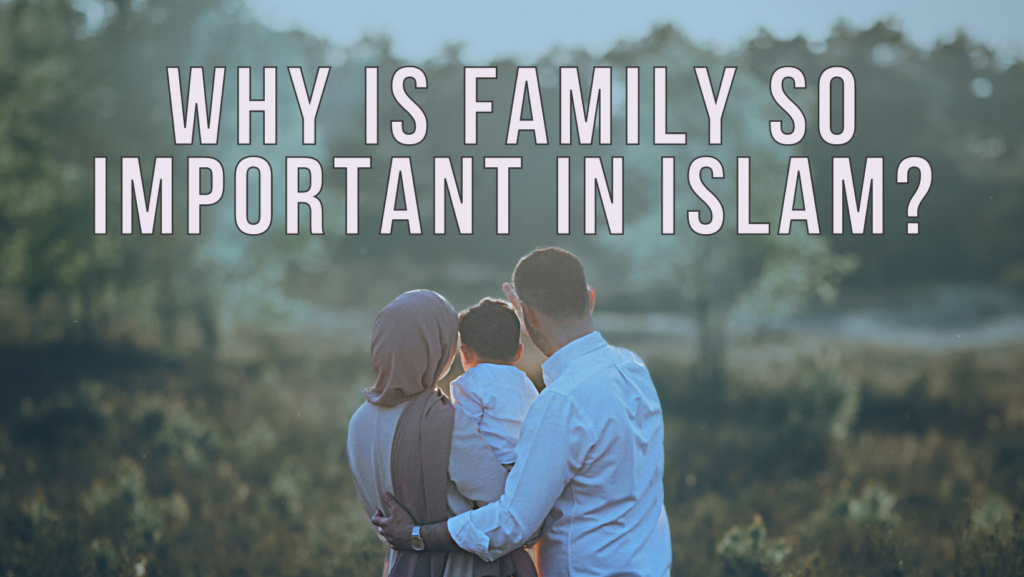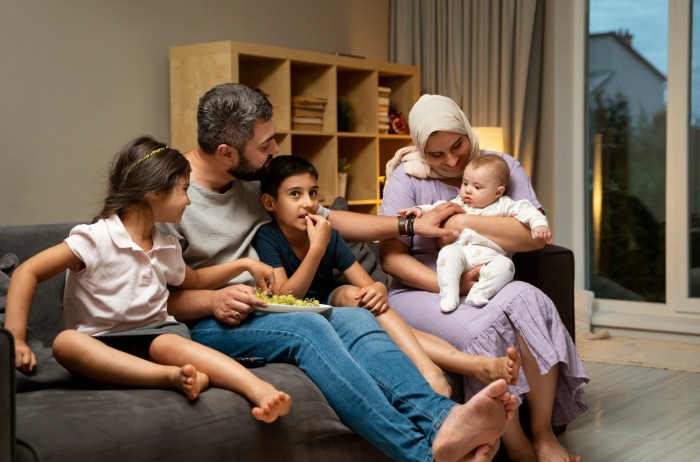Family in Islam is the basic social unit on which the structure of the Muslim society is based, and it is the first building block on which the Islamic nation is built. In this article, we explain the concept of the family from the Islamic view, its importance to the individual and society, the role of its members and the reason why Islam is proud of it.
The concept of the family in Islam
The family in Islam can be considered a social unit that plays an important role in building society, if the family is taken care of and the appropriate conditions are provided for its formation and development, this will contribute to building a strong, stable and prosperous society spiritually and socially,
and the family is of great importance and is considered the basic unit in the Muslim society, and the family is defined in Islam as the meeting of men and women within a legal framework, which is marriage, and it is established on the basis of affection, mercy and cooperation. The Almighty said:
“Among His signs is that He created for you mates from among yourselves, that you may dwell in tranquility with them, and He has put love and mercy between your hearts. Verily, in that are signs for those who reflect.” [Ar-Rum: 21].
“O mankind, fear your Lord, who created you from one soul and created from it its mate and dispersed from both of them many men and women. And fear Allah, through whom you ask one another, and the wombs. Indeed Allah is ever, over you, an Observer.”[An-Nisa: 1]
The Importance of Family in Islam
Family holds great importance in Islam as it forms the foundation of the Muslim community and plays a crucial role in achieving stability and prosperity. The significance of family in Islam can be understood through the following points:
1- Human Procreation
Family is the basis of human procreation, as without it, the human species cannot continue. Islam encourages marriage and forming families, as God says, “And among His signs is that He created for you mates from among yourselves, that you may dwell in tranquility with them, and He has put love and mercy between your hearts. Verily, in that are signs for those who reflect.” [Surah Ar-Rum: 21]
Read also about: Dialogue styles in the Quran
2- Societal Stability
Family is the cornerstone of societal stability in Islam. It contributes to creating a sense of security and safety within the community. Family provides individuals with love, compassion, and a place to reside, protecting them from moral deviance and decay.
Strengthening the role of the family in society has a positive impact on social upbringing and the development of individuals who later contribute to the progress of the community.
3- Foundation of Islamic Education
Family serves as the foundation for Islamic education. It is responsible for raising children upon Islamic morals and noble values, instilling in them a love for goodness and virtue. Allah says, “O you who believe! Protect yourselves and your families from a Fire (Hell) whose fuel is people and stones…” [Surah Al-Tahrim: 6]
4- Safeguarding Society from Moral Decay
Family, in Islam, acts as a shield to protect society from moral decay. It promotes virtues and good morals while preventing the spread of immorality and corruption.
Allah says, “And indeed, We have honored the children of Adam and carried them on the land and sea and provided for them of the good things and preferred them over much of what We have created, with [definite] preference.” [Sura Al-Isra: 70]
In conclusion, family holds a central position in Islam, contributing to the procreation of humanity, societal stability, Islamic education, and safeguarding society from moral decay. Upholding the values and importance of the family in Islam is vital for the well-being and progress of the Muslim community.

Read also about: Human Rights in Islam
What are the rights of family members?
The rights of family members in Islam are a set of rights recognized by Islam for family members, and all family members must respect and apply them. These rights include:
1- Rights of the spouse
In Islam, the husband has many rights, including:
- The right of obedience from the wife: The wife must obey her husband without disobeying Allah.
- The right of affection and mercy from the wife: to treat her husband with kindness, and to make him feel affection and mercy.
- Right of guardianship over the wife: The husband enjoys guardianship over his wife in all matters concerning her.
2- Wife’s rights
In Islam, the wife also has rights that the husband must fulfill, including:
- Dowry right: The husband must pay the dowry to the wife when contracting with her, as evidence of his desire to marry her.
- Right to alimony: to spend on his wife from her own money, if he is rich or able to spend on her.
- The right to housing: to provide his wife with adequate housing, in a safe and comfortable place.
- The right to care for children: to participate in the care of children, in cooperation with the wife.
- The right to respect: to respect his wife, in all cases.
3- Children’s rights
Islam has come with special rights that parents must fulfill, including:
- Right to care and upbringing: Parents should take care of the care and upbringing of their children, on the basis of Islamic morals.
- The right to education: to provide their children with a quality education, so that they can build their future.
- The right to inherit: Children have the right to inherit from their parents after their death.
4. Parental rights
Parents have rights that should not be overlooked, including:
- The right of righteousness and obedience: Children must honor their parents and obey their commands, without disobeying God.
- The right to be benevolent: Children must treat their parents well in all circumstances.
- The right to pray for them: to pray for their parents with good, so that God will reward them with the best reward.
5. Rights of relatives
Among the rights of relatives in Islam:
- Right to communicate and visit: Relatives must communicate with each other and visit each other.
- The right to help: to help each other through thick and thin, according to their ability.
- The right of pardon and forgiveness: to pardon each other for sins and sins, so that harmony can be achieved between them.

Read also about: Modern methods of memorizing the Quran
Why is family the foundation of society in Islam?
In Islam, the family is considered the foundation and fundamental unit of society. The family plays a vital role in building and maintaining the stability and development of the community. There are several reasons why the family is important in Islam:
-
Family as an Educational Unit
The family is the primary unit for nurturing the new generation in Islam. It provides a safe and stable environment for children to develop and learn Islamic values and ethics. It promotes emotional and educational communication between generations and facilitates the transmission of cultural and religious heritage from one generation to another.
-
Family as a Source of Love and Mercy
Islam emphasizes the importance of love and mercy within the family. Spouses cooperate to build a happy and stable life, treating each other with love, respect, and justice. The family becomes a refuge for compassion, cooperation, and mutual support among its members.
-
Family as a Source of Cooperation and Solidarity
Islam encourages cooperation and solidarity within the family. It strengthens strong family relationships and encourages individuals to assist one another in daily needs and crises. It pays attention to the care of vulnerable and needy individuals in their early stages of development and provides psychological and material support to its members.
-
Family as a Source of Social Stability
Family stability is considered one of the factors contributing to social stability in society. If the family is healthy and stable, it has a positive impact on the entire community. Conversely, if the family suffers from disintegration and disturbances, it can have negative consequences on society, leading to social instability.
Read also about: Worship in Islam
As the family is the basis of society in Islam, we must pay it the necessary attention and care, when the family is strong and stable, the positive effects are reflected on the entire society, so we must work to strengthen the bonds of love, mercy and cooperation within the family, and be a good example for our children in applying the teachings of Islam in our daily lives.
In this regard, Wahion Youha Academy for Quranic Sciences seeks to emphasize the importance of the role of the family in Islam, and provides many courses and rehabilitation and educational programs that help raise individuals on Islamic values, and you can join now and book a trial class for free.


